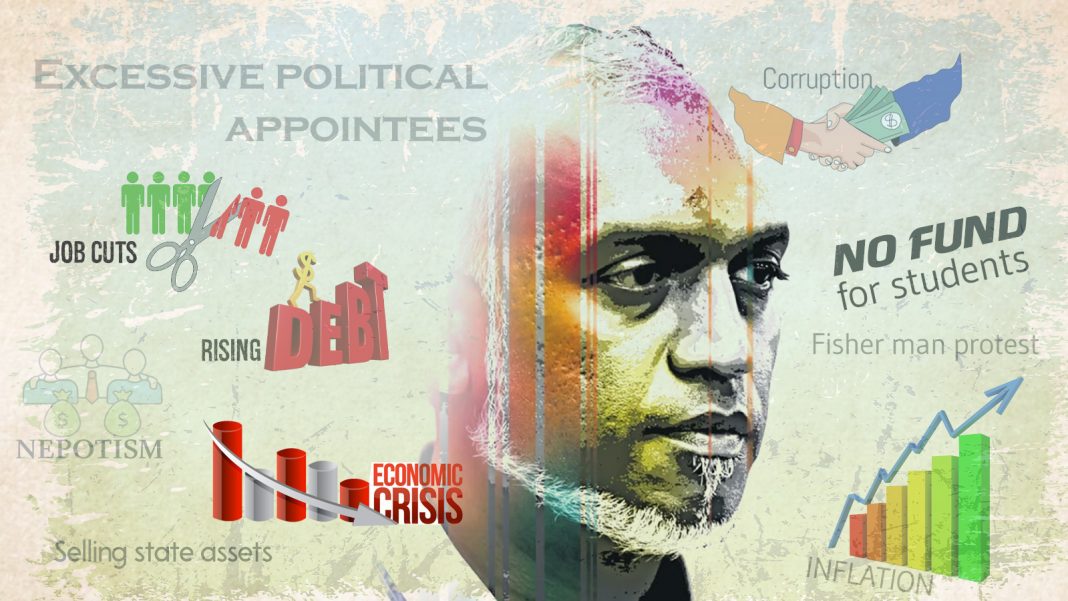Under the leadership of President Muizzu, the country is grappling with a decline in its economy and several issues that are affecting the lives of everyday people. Here’s a simple look at what’s happening.
Economic Decline and Downgrade
Recently, Fitch, a global rating agency, downgraded the Maldives’ credit rating to CCC+. This rating is like a school report card, but for countries, and it’s not a good grade. It means that investors see the Maldives as a risky place to put their money, which can lead to less foreign investment.
Falling Foreign Reserves
The country’s foreign reserves, which are like a savings account used for international expenses, have dropped significantly. In May 2024, reserves fell to USD 492 million from USD 748 million. This decline makes it harder for the government to pay for things from other countries.
Rising Debt
The Maldives’ debt is also growing. By 2025, the country needs to pay back USD 557 million, and by 2026, this amount will exceed USD 1 billion. This includes repaying a USD 500 million sukuk (a type of Islamic bond). This massive debt repayment is putting a lot of pressure on the government’s finances.
Impact on Common People
To manage these financial issues, the government is trying to cut spending. Unfortunately, this often means job cuts and reductions in social welfare programs. Taxes may also increase, which can burden everyday people. As a result, economic instability is rising, leading to higher inflation (prices going up) and job insecurity.
Government Actions and Mismanagement
Under President Muizzu’s administration, several decisions have sparked criticism:
- Job Cuts and Corruption: Recently, the government dismissed hundreds of state employees. There are also allegations of corruption and nepotism. For example, Parliament Speaker Abdul Raheem’s family members hold eight key positions, earning MVR 1 million monthly in salaries. Islamic Minister Mohamed Shaheem’s son, Abdulla Mahil Shaheem, was appointed to the High Commission of Maldives in Malaysia with a salary of more than MVR 100,000. Shaheem’s brother, Ahmed Shifaz, was appointed as the Deputy Minister of Tourism.
- Excessive Political Appointees: Despite promises to reduce political appointments, there are over 2,000 political appointees costing the government MVR 86 million in salaries.
- Unnecessary Expenses: The government spent USD 37 million on drones from Turkey, which have been ineffective. Additionally, there have been costly foreign trips without tangible benefits.
- Selling State Assets: The government has signed a contract to hand over the country’s main commercial harbor, managed by the Maldives Ports Limited (MPL), to a Philippine company for 25 years, raising concerns about national assets being controlled by outsiders.
- Fishermen’s Protests: Fishermen have protested due to not being paid for their catch, highlighting the struggles within local industries.
- Education Funding Issues: Maldivian students studying abroad on government scholarships are struggling to pay rent and tuition fees due to lack of funds.
Lack of Transparency
The government has also been criticized for a lack of transparency. Many agreements with China have not been disclosed, and the government is not responding to information requests. The government is now trying to include secret amendments to the Right to Information Act under the legislative agenda. The government is also trying to introduce a new journalism law for the first time, which could have ways of punishing journalists.
International Relations
The Maldives’ financial woes have also impacted its international relations. The United States has warned the Maldives about blacklisting Israel, stating that such actions could lead to a cut in American financial assistance. U.S. Representative Josh Gottheimer said, “Taxpayer dollars shouldn’t be sent to a foreign nation that has banned all Israeli citizens from traveling to their country. They shouldn’t get a cent of American dollars until they reverse course.” The U.S. provided roughly $36 million in financial assistance to the Maldives between 2019 and 2023.
The economic situation in the Maldives is complex and challenging, with significant impacts on the lives of everyday people. The combination of declining reserves, rising debt, job cuts, and controversial government actions is creating a difficult environment. It remains to be seen how the government will address these issues and steer the country toward stability and growth.


















